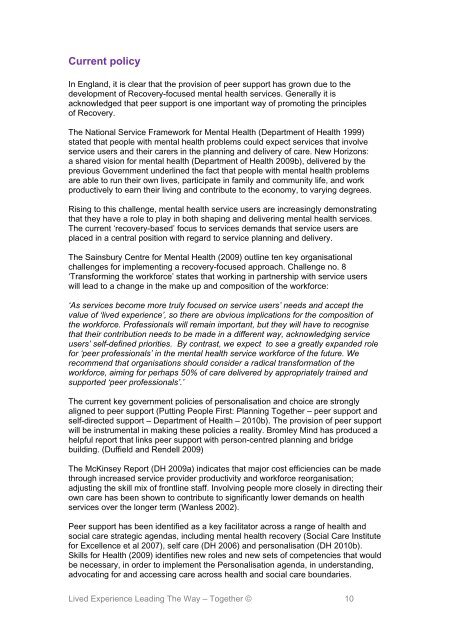Lived Experience Leading The Way – Together © 1
1IOaWqu
1IOaWqu
- No tags were found...
Create successful ePaper yourself
Turn your PDF publications into a flip-book with our unique Google optimized e-Paper software.
Current policyIn England, it is clear that the provision of peer support has grown due to thedevelopment of Recovery-focused mental health services. Generally it isacknowledged that peer support is one important way of promoting the principlesof Recovery.<strong>The</strong> National Service Framework for Mental Health (Department of Health 1999)stated that people with mental health problems could expect services that involveservice users and their carers in the planning and delivery of care. New Horizons:a shared vision for mental health (Department of Health 2009b), delivered by theprevious Government underlined the fact that people with mental health problemsare able to run their own lives, participate in family and community life, and workproductively to earn their living and contribute to the economy, to varying degrees.Rising to this challenge, mental health service users are increasingly demonstratingthat they have a role to play in both shaping and delivering mental health services.<strong>The</strong> current ‘recovery-based’ focus to services demands that service users areplaced in a central position with regard to service planning and delivery.<strong>The</strong> Sainsbury Centre for Mental Health (2009) outline ten key organisationalchallenges for implementing a recovery-focused approach. Challenge no. 8‘Transforming the workforce’ states that working in partnership with service userswill lead to a change in the make up and composition of the workforce:‘As services become more truly focused on service users’ needs and accept thevalue of ‘lived experience’, so there are obvious implications for the composition ofthe workforce. Professionals will remain important, but they will have to recognisethat their contribution needs to be made in a different way, acknowledging serviceusers’ self-defined priorities. By contrast, we expect to see a greatly expanded rolefor ‘peer professionals’ in the mental health service workforce of the future. Werecommend that organisations should consider a radical transformation of theworkforce, aiming for perhaps 50% of care delivered by appropriately trained andsupported ‘peer professionals’.’<strong>The</strong> current key government policies of personalisation and choice are stronglyaligned to peer support (Putting People First: Planning <strong>Together</strong> <strong>–</strong> peer support andself-directed support <strong>–</strong> Department of Health <strong>–</strong> 2010b). <strong>The</strong> provision of peer supportwill be instrumental in making these policies a reality. Bromley Mind has produced ahelpful report that links peer support with person-centred planning and bridgebuilding. (Duffield and Rendell 2009)<strong>The</strong> McKinsey Report (DH 2009a) indicates that major cost efficiencies can be madethrough increased service provider productivity and workforce reorganisation;adjusting the skill mix of frontline staff. Involving people more closely in directing theirown care has been shown to contribute to significantly lower demands on healthservices over the longer term (Wanless 2002).Peer support has been identified as a key facilitator across a range of health andsocial care strategic agendas, including mental health recovery (Social Care Institutefor Excellence et al 2007), self care (DH 2006) and personalisation (DH 2010b).Skills for Health (2009) identifies new roles and new sets of competencies that wouldbe necessary, in order to implement the Personalisation agenda, in understanding,advocating for and accessing care across health and social care boundaries.<strong>Lived</strong> <strong>Experience</strong> <strong>Leading</strong> <strong>The</strong> <strong>Way</strong> <strong>–</strong> <strong>Together</strong> <strong>©</strong> 10


